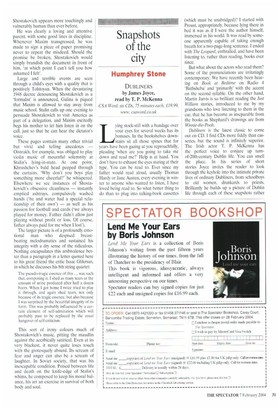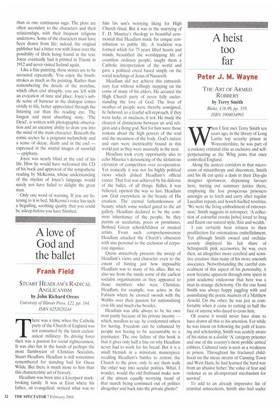Snapshots of the city
Humphrey Stone
DUBLINERS by James Joyce, read by T. P. McKenna CSA Word, six CDs, 75 minutes each, £19.99, www. csaword.co.uk Lying stock-still with a bandage over your eyes for several weeks has its bonuses. In the bookshelves downstairs sit all those spines that for years have been gazing at you reproachfully, pleading 'when are you going to take me down and read me?' Help is at hand. You don't have to exhaust the eyes staring at their type. You can be read to. Ever since my father would read aloud, usually Thomas Hardy or Jane Austen, every evening in winter to anyone who wanted to listen, I have loved being read to. So what better thing to do than to plug into talking-book cassettes (which must be unabridged)? I started with Proust, appropriately, because lying there in bed it was as if I were the author himself, immersed in his world. It was read by someone apparently capable of taking enough breath for a two-page-long sentence. I ended with The Leopard, enthralled, and have been listening to, rather than reading, books ever since.
But what about the actors who read them? Some of the pronunciations are irritatingly contemporary. We have recently been hearing on Book at Bedtime on Radio 4 'Bathsheba' and 'primarily' with the accent on the second syllable. On the other hand, Martin Jarvis is so brilliant reading the Just William stories, introduced to me by my grandsons who love listening to them in the car, that he has become as inseparable from the books as Shephard's drawings are from Winnie-the-Pooh.
Dubliners is the latest classic to come Out on CD. I find CDs more fiddly than cassettes, but the sound is infinitely superior. The Irish actor T. P. McKenna has the perfect voice to conjure up turnof-20th-century Dublin life. You can smell the place. In his series of short stories Joyce invites the reader to look through the keyhole into the intimate private lives of ordinary Dubliners, from schoolboys to old women, drunkards to priests. Brilliantly he builds up a picture of Dublin life through each of these snapshots rather
than as one continuous saga. The plots are often secondary to the characters and their relationships, with their frequent religious undertows. Some of the characters must have been drawn from life: indeed, the original publisher had a bitter row with Joyce over the possibility of libels being found in the text. Joyce eventually had it printed in Trieste in 1912 and never visited Ireland again.
Like a fine painting, these stories are to be savoured repeatedly. You enjoy the brushstrokes as much as the painting. Rather than remembering the details of the storyline, which often end abruptly, you are left with an evocation of time and place. Joyce's subtle sense of humour in the dialogue comes vividly to life, better appreciated through the listening ear than the reading eye. The longest and most absorbing story. `The Dead', is written with photographic observation and an uncanny ability to draw you into the mind of the main character. Beneath the comic scenes lie a poignant melancholy and a sense of decay, death and in the end — expressed in the wistful images of snowfall — epiphany.
Joyce was nearly blind at the end of his life. How he would have welcomed this CD of his book and approved of the sympathetic reading by McKenna, whose understanding of the rhythm of Joyce's language would surely not have failed to delight the great man.
Only one word of warning. If you are listening to it in bed, McKenna's voice has such a beguiling, soothing quality that you could be asleep before you have finished.



























































 Previous page
Previous page